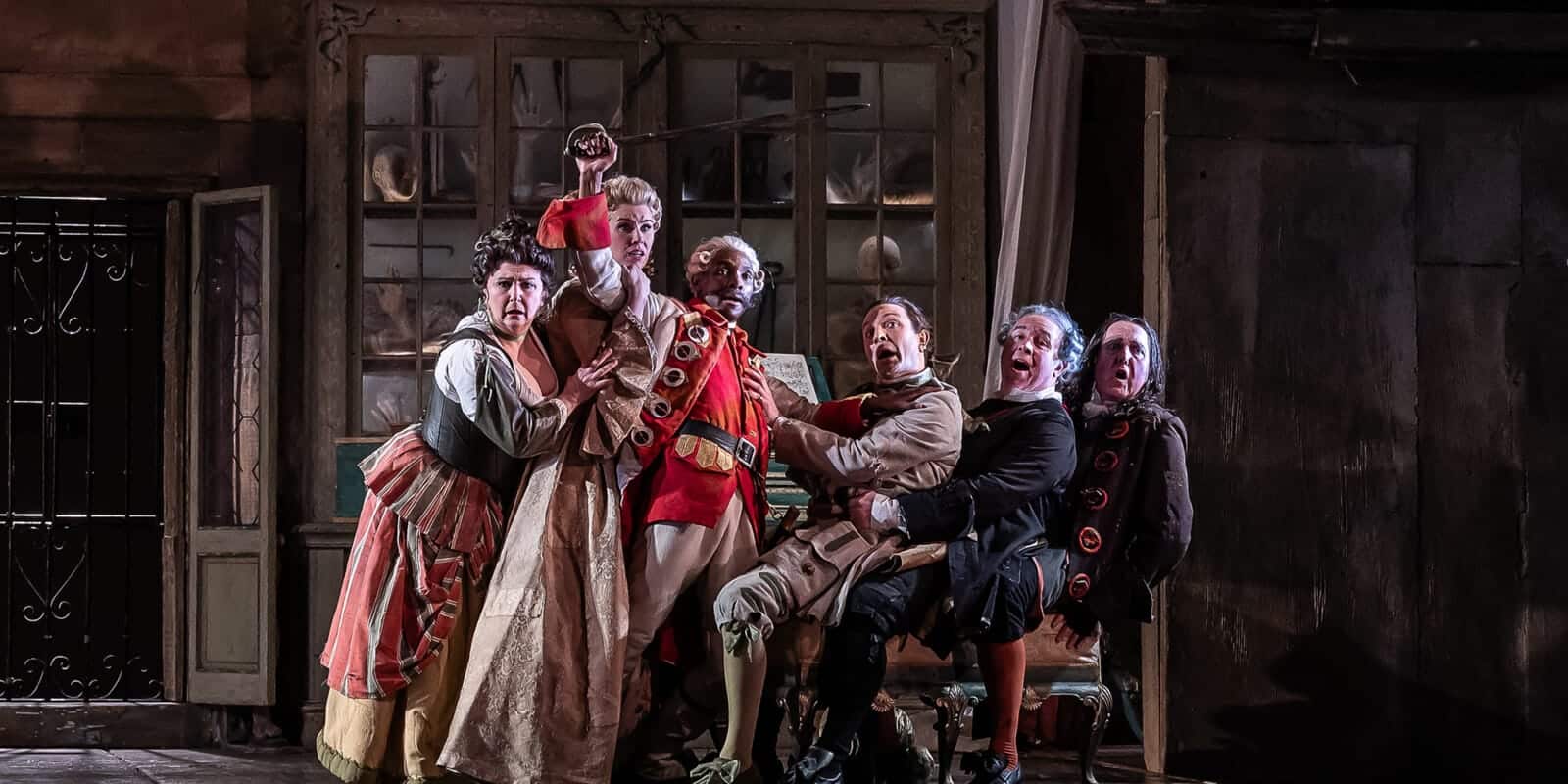Smiles all round as ENO revives Jonathan Miller’s Barber
OperaReview by Alastair Macaulay:
At one time in the last century, there was a theory that no opera production should last in repertory longer than five years. But that theory depended on vast financial resources such as few cities possess, since opera, with its scenery and costumes, is often among the most expensive of art forms. London isn’t one of them: it has long had a number of productions going back over thirty years, several of which is the late Jonathan Miller’s production of Rossini’s “The Barber of Seville”, new in 1987.
My memory of the 1987 version is that Miller gave London an admirably stylish, picturesque, and clever production that originally failed to bring out the fun in this classic comedy. The cast, led by Della Jones (Rosina) and Alan Opie (Figaro), was vocally splendid; but the production – handsomely designed by Tanya McCallin – rather coldly laid bare the somewhat heartless nature of this work, whose roots, like so much Italian comedy, go back to the commedia dell’ arte (and beyond that to the Roman comedies of Plautus and Terence). There are lovers at the heart of the plot, but the story isn’t about their love, it’s about their clever machinations to elude the authority of the senior generation. Miller and McCallin dressed some of the choral figures in traditional commedia costumes, with white clothing, tall white hats, and dark masks.
Subsequent revivals, however, staged by various English National Opera assistant directors, have released the naughty-prankster zest of this opera. Peter Relton directs this revival, as he has directed several previous ones this century; this is “Barber” as romp, ridiculing (without cruelty) parts of society that seem tiresome or foolish, and celebrating young love not as emotional but as irresistibly energetic.
The English translation by the late Amanda Holden and Anthony Holden is often very free, and occasionally hilarious: when the drunken soldier (Count Almaviva in disguise) bungles Doctor Bartolo’s name, he calls him “Dr Bernardo”, and finally “Dr Bungalow”. Bartolo, a character of the early nineteenth century, harks back nostalgically to the good old days “when opera was opera and men were sopranos”. Bartolo is a bass role, but in this 2024 revival, Simon Bailey at this point breaks into a brilliant countertenor facsimile of castrato vocalism: it’s funny even if you don’t know the history of opera.
At every level of this revival , English National Opera – set to leave London forever this summer – is declaring itself as a vividly engaging troupe worthy of the capital city. Charles Rice has all the extrovert charm and exuberant energy of Figaro. Innocent Masuku, singing with touching vocal beauty in quiet passages, matches that energy in Count Almaviva’s many assaults on the Bartolo household. Anna Devin, a soprano in a role best played by mezzos, has all the dangerous naughtiness required. Rossini asks coloratura brilliance of all these three: their vocalism under rapid pressure could be more suave, but – working closely with conductor Roderick Cox – they never lack the brio that is quintessential to this composer. Alastair Miles as the clinically corrupt Don Basilio has the vocal potency for the role; but he’s the one member of the cast whose physical acting seems applied from outside – it’s all exterior effects, without inner life.
Rossini, writing over two centuries ago, was composing with a new kind of kinaesthetic rhythmic vitality: his is what I call “instep music” – not just toe-tapping music, but music that, irresistibly, keeps lifting my heels up above my toes. Cox, conducting. catches that vital aspect of Rossini; he also catches Rossini’s abundant wealth of colour and panache from the overture onwards.
photo: Clive Barda/ENO






Anything Jonathan Miller produced, he managed to turn into gold. My first encounter was his production of 1978/79 when I was in Kent Opera and he produced La Traviata. He went on to do great things, and this Barber no exception.
Agreed. I still remember his wonderful Rigoletto that came to NYC, where Rigoletto is behind the bar and the “Duke” is a mafia boss. The only updating that has ever worked, in my opinion
His Rigoletto at ENO was what got me into opera in the first place.
A slight amendment to the review though – ENO isn’t moving out of London for a couple more years.
Dr Bartolo is finally called “Bastardo”, not “Bungalow”!
Not quite. The order is Banardo, then Bastardo, and finally Bungalow.